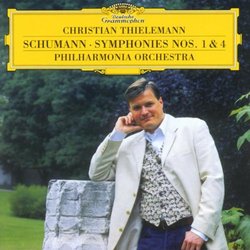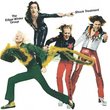| All Artists: Robert Schumann, Christian Thielemann, Philharmonia Orchestra Title: Schumann: Symphonies Nos. 1 & 4 - Christian Thielemann / Philharmonia Orchestra Members Wishing: 0 Total Copies: 0 Label: Deutsche Grammophon Original Release Date: 1/1/2001 Re-Release Date: 11/13/2001 Genre: Classical Style: Symphonies Number of Discs: 1 SwapaCD Credits: 1 UPC: 028946970027 |
Search - Robert Schumann, Christian Thielemann, Philharmonia Orchestra :: Schumann: Symphonies Nos. 1 & 4 - Christian Thielemann / Philharmonia Orchestra
 | Robert Schumann, Christian Thielemann, Philharmonia Orchestra Schumann: Symphonies Nos. 1 & 4 - Christian Thielemann / Philharmonia Orchestra Genre: Classical
|
Larger Image |
CD DetailsSimilar CDs
|
CD ReviewsThe worst recording ever made? Tom Gauterin | Loughborough, Leics. United Kingdom | 02/11/2002 (1 out of 5 stars) "Good grief. Having bought Christian Thielemann's splendid recordings Schumann's Second(an especially marvellous interpretation) and Third Symphonies, I was looking forward to hearing what insights he could bring to the First and Fourth. Unfortunately, the resulting CD contains the worst performances of any pieces of the central repertoire that I(and a number of friends whose musical opinions I value) have ever heard. I am in a particularly advantageous position to appreciate just how dreadful the performance of the Fourth is since, in the week when I bought this recording, I conducted the piece twice. The First Symphony, while sluggish and with little feel for instrumental colour, is marginally more successful but most of the comments about the Fourth can be applied to that piece too, more's the pity. To start at the beginning: there is a dreadful edit thirty seconds in to the first movement of the Fourth, when a clarinet pops up from nowhere. Surely, if Deustche Grammophon are willing to pay the huge expenses of hiring a conductor, orchestra and recording team, they could iron out errors like this? Sonic mistakes aside, the performance is simply awful. Thielemann actually succeeds in making the Philharmonia(who, believe me, are one of the world's very best orchestras) sound unpleasant. The balances throughout are poor; chiefly, the winds, brass and timpani are muffled behind a thick blanket of string sound and there is seemingly no attempt to ensure precision of ensemble. Entries are messy on an unacceptably large number of occasions(more than this orchestra would flunk live) and, as a result, the symphony sounds monochrome and slack. Thielemann's tempos are, uniformly, far too slow; in the first movement of the Fourth, he finally reaches the tempo he should have started with by the end of the movement by producing an unmarked accelerando. The Romanze is also far too sluggish; it doesn't sound beautiful, just stodgy. Similar problems affect the finale(in which, I was dismayed to find having already suffered through 65 minutes of this CD, Thielemann observes the big repeat). So much for the playing and timings. As for the actual interpretation, Thielemann does actually suggest that he has no understanding of sonata form(or indeed any musical sense) whatsoever. Almost every interpretative gesture he makes weakens the structure of the symphony. The most glaring example is in the first movement. Around bar 130(and at the repeat), after the dramatic pauses that Schumann indicates, Thielemann inserts the most tasteless(and, not surprisingly, unmarked) ritardando that I've ever heard. Although the passage is marked 'dolce', there should be no slowing since this breaks the line of the movement. Conducting the piece myself, I went to great lengths to ensure that my violinists stayed in tempo. Similarly, 'dolce' does not mean 'produce enough vibrato that you get the fiddle to sound like a Wagnerian soprano.' Thielemann, however, is more than happy to do just that. There are, it seems, two ways of interpreting Schumann's 4th: a)emphasise its continuity(a la Gunter Wand, whose RCA recording is currently unavailable) or b)emphasise differences(as Harnoncourt does in his Berlin Philharmonic recording). Thielemann succeeds neither in one of these options nor in forging his own way forward. In sum, this is a badly played(although frankly I'm not surprised that the Philharmonia sound fed up of the whole mess), poorly recorded(nasty 'glassy' string sound), utterly witlessly interpreted performance. It's a waste of money, an insult to the composer and what is, thankfully, an increasingly rare item: a total artistic disgrace. Avoid it and stick to Wand, Kubelik or Harnoncourt." Disappointingly inferior Jeffrey M. Pratt | Lehi, UT, USA | 09/02/2002 (2 out of 5 stars) "Though it's been over two weeks since I first heard this recording, I am still somewhat in shock over its inferiority. I suppose I wouldn't be so surprised if this recording wasn't made by Deutsche Grammophon, one of the most respected labels in classical music recording. As another reviewer indicated, about 30 seconds into the introduction of the first movement of the Fourth Symphony, there is a definite and noticeable "jump" of about one second. I initially thought this was a flaw in the disc, so I returned it to get another one. However, I found, to my horror, that that disc exhibited the same jump. It, therefore, couldn't have been a problem with the disc, but a problem with the editing or with the master tapes. Before I returned the disc, I contacted DG to see whether they knew anything about this. To their credit, they diligently pursued the matter, but to their discredit, they did not hear the flaw that I heard. I already own Thielemann's other recordings of Schumann's symphonies, and I wanted to round out my collection with this. Unfortunately, however, this otherwise fine recording is marred by a fatal flaw, and therefore I must recommend that the collector look elsewhere for worthy recordings of Schumann's symphonies." Soft-grained, romantic styling that can be very poetic Santa Fe Listener | Santa Fe, NM USA | 02/23/2008 (5 out of 5 stars) "A newcomer to this Schumann First and Fourth from Thielemann would be hard pressed to know what it's like from the previous reviewers. The five-star review claims that the sytle here is like Masur and Kubelik when in fact those conductors prefer Schumann to be swift, bright, and extroverted while Thielemann is the opposite: this is measured, carefully molded, poetic Schumann to the extreme. The negative reviews carp about the recording quality, which is actually very fine, absent a single editing glitch.
So let's start from scratch. Clearly Thielemann is bucking the modern trend of making the German classics swift and lean. Does he succeed? I think on the whole he does. Begin with the slow movement of the "Spring" Sym. and you will kow immediately if you like his surging, soft-grained, almost dreamy approach. Thielemann was more distinctive early in his career, but if you check his recent Parsifal and Tristan, you'll hear the same soft grain and neo-romantic sensibility. Frankly, I was intrigued and my attention never wandered. Whether you like it or not -- and some might carp that this is just imitaiton Furtwangler -- this conductor clearly has something original to say, and that alone is much appreciated." |

 Track Listings (8) - Disc #1
Track Listings (8) - Disc #1


